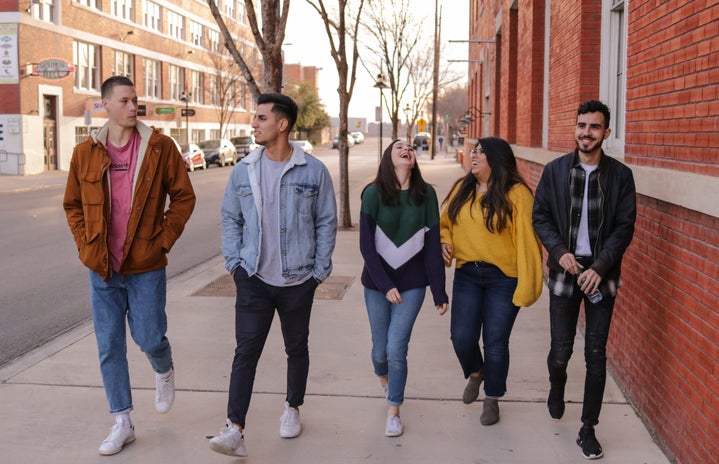**Content Warning: This article contains detailed discussion of depression and suicide. Please keep this in mind if you continue to read.**
**Note: This article contains spoilers.**
A few weeks ago, 13 Reasons Why premiered on Netflix. Adapted from Jay Asher’s novel of the same name, it tells the story of Clay Jensen as he listens to 13 tapes that Hannah Baker—a girl who recently committed suicide—left behind, detailing her reasons for taking her life. It’s a story that’s meant to spark conversation. It wants its audience to be more conscious of the way others are treated. Fascination for the tale has resurfaced in light of the Netflix show, and people on social media have boasted the show’s inclusivity and important message. Still, I find myself reluctant to jump on the bandwagon.
My experience with 13 Reasons Why, I’ll admit, has never been very pleasant. I was forced to read it in the 9th grade; two weeks were spent reading along with an audiobook in English class. I grew very frustrated with the novel and with its premise at that young age, but it’s only now that I think I can put my aggravation into words.
I should note that I have not finished the series. I do not plan to. Just a few days ago, my friend let me know that he had finished the show and that he had to take a couple of days off from schoolwork to recover. That friend is not particularly sensitive. In the seven years I’ve known him, he has never been easily triggered. But 13 Reasons Why really messed with him, even though he fast-forwarded through the especially graphic parts of the show. When I spoke to him about it, he said that he hoped people went away with something from the show, but that it was really painful to watch. The trend I’ve seen online is this: the show has been harrowing for many mentally ill or suicidal people, but many deem that as a necessary evil, so that non-suicidal people can see the effects of their actions.
The thing is, I don’t think mentally ill people need to suffer so that some people learn to be nice to others. I have trouble wrapping my mind around the fact that it takes a graphic, triggering TV show for people to realize they should be decent human beings. I’m not comfortable with a TV show claiming that it wants to help suicidal teens as it alienates them and reminds them of traumatic experiences.
One of my biggest issues with the show is the way it depicts Hannah’s suicide. From what I remember of the novel, Hannah originally overdosed. There was very little mention of the death itself. Instead, the focus was on the build-up and the aftermath. The show did not take such an approach. Hannah’s death in the series is bloody and brutal. She cuts deep into her arms and bleeds out in a bathtub, crying. 13 Reasons Why is even gracious enough to let us see her parents when they find her body. Alternating these scenes is Clay, passionately declaring that many people could have prevented her death. Incredible. So powerful and moving, right?
Wrong. It’s sickening. There are more tactful ways to handle the topic than this. If it takes three minutes of watching a girl cut into her wrists and bleed out in a bathtub to think about how your actions affect others, something is wrong with you. When I went on my personal Twitter to complain about this, I was met with three responses: 1) “You’re completely missing the point of the show… It’s supposed to be hard to watch!” and 2) “There are trigger warnings lol… it’s your fault for watching it,” and, my personal favorite, 3) “Dumbest tweet of the day goes to you!!!”
I know that these people were only defending a show that they thought had an important message. I know that they were likely speaking from a place of emotional attachment; it meant something to them, so it was astonishing when others didn’t feel the same way. I realize all of this objectively. But even now, it really only makes me angrier.
I understand that the show is meant to be hard to watch. My stance is that the show could have had powerful moments without being so genuinely and horrifically triggering. There were trigger warnings in the show, but I’ve never been easily triggered, so I figured that I would be okay. My friend thought he would be okay. Tons of mentally ill people thought that they would be okay. That finally, they could watch something that addressed what they were going through and aimed to protect them.
But 13 Reasons Why was just a letdown. It had, with its diverse cast, a unique opportunity to do a lot of good. But it didn’t. Instead, it took a moment that wasn’t even described in the book and made it awful to watch. It’s much easier to use mentally ill kids to teach healthy kids a lesson than it is to create an accessible show.
My reply to the third response is this: it’s incredibly ironic that you’re standing up for a show about watching how you treat others by attacking me on the internet. Surely, you must see that. This leads me to my next point: I don’t think 13 Reasons Why is doing as much good as it boasts it is. People have fought me on this, saying that 13 Reasons Why opened up conversations about suicide. I don’t think this is true, though. So, so many mentally ill and suicidal people have tried speaking up about the issues they have with this show and society’s treatment of us as a whole, only to be silenced by people who would like to feel good about their conscientiousness. I know that there are people out there who are also ill and who enjoyed the show. But it’s been my experience so far that even those people have silenced others in the community who disagree with the show and have told them to grow up. The fact of the matter, however, is that triggers work differently for everyone. We need to be conscious of the fact that what we can handle isn’t necessarily what someone else can.
Structurally, that was the issue I had with 13 Reasons Why a few years ago. We learn by the end of the story that Clay really did nothing wrong. He feels as though he could have prevented Hannah’s death by letting her know that he cared for her, but he is ultimately the “good guy.” I really don’t like that, though. I think that it’s wrong to have a narrator whose only fault was that he didn’t do enough. I think it lets people breathe a sigh of relief at the end of the story. It’s fine, people say to themselves. I’m like Clay. I haven’t actually hurt anyone yet. But the honest truth is that we’ve all hurt people. We all have things to apologize for. To think that anyone is guiltless is absurd, but Clay’s perspective allows for people to feel that way. (Nearly) everyone thinks that they’re a good person. Suddenly, every Bryce or Courtney in the world can feel like Clay. Can watch the show and hold themselves morally upright with little introspection. And for what? I’ve heard people say that 13 Reason Why messed them up, but that’s as far as the conversation has gone. It’s never been about suicide prevention. It’s about presumptuous morality.
I also think it’s valiant that it tries to present Clay as some sort of solution. The message of the show implies that if Hannah had support, maybe she would have made it. It’s easy to see where Clay is coming from. But the issue of presenting that viewpoint to thousands of viewers is that it ignores the fact that sometimes mental illness is just bigger than you. Sometimes, people have all the support in the world but it’s not enough. It happens. Many depressed or suicidal people get into relationships and think that this will act as a cure, because that’s what the media tells them. The issue with placing the blame of Hannah’s death on specific people is that it attacks Hannah’s agency and the large role that her depression probably took in the build-up to her suicide. Audiences suffering as Hannah did might think, then, that their fate is in the hands of others. That for things to get better, others have to change. This is a dangerous implication, and it highlights the need for more nuanced representation of mental illness in today’s media. Hannah is one case of depression in a world where millions of people struggle and cope with depression daily.
We need to start giving mentally ill people shows that they can relate to without attacking their most sensitive memories. There is a middle ground between “sugar-coating” or ignoring suicide and being gratuitous and overly graphic about it. I’m glad this show means something to some people. I’m just not really comfortable enough to welcome it with open arms. When we find some middle ground, we might be able to do some good. Until then, survivors and mental health advocates will just keep yelling until you hear us.

